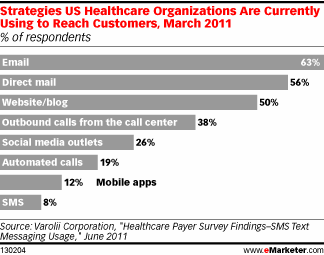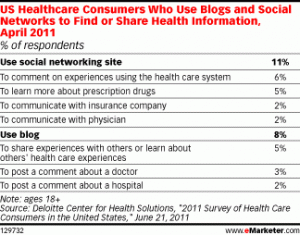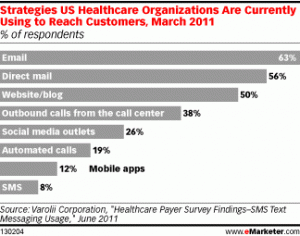As people share more of their lives online via social media channels, it comes as no surprise that this includes stories about trials and tribulations with their health and healthcare. People look for support, recommendations for providers, to learn about others’ experiences with hospitals and physicians, and many other types of health information as the Deloitte Center for Health Solutions found in their April 2011 survey.
Joining the Conversation
Facebook has seen a rapid increase in the number of health-related support pages, which evidences the growing demand for this information among social media channels. According to eMarketer, Susan G. Komen for the Cure, a breast cancer and breast health non-profit organization, for example, has nearly 500,000 “likes” on its Facebook page. The American Diabetes Association Facebook page has more than 100,000 “likes.” However, only 26% of healthcare organizations are currently implementing social media strategies as part of their overall marketing endeavors notes communications software company Varolii. The majority are still utilizing more traditional channels such as websites, email, and direct mail. So why the delay in changing tactics when so many other industries have eagerly embraced social media?
Role of the FDA
The Food and Drug Administration (FDA) was scheduled to release its highly anticipated social media guidelines in the first quarter of 2011, but delayed and has been tight lipped about when the guidelines may actually be published. Their spokesperson has stated that they are a “high priority” but many healthcare marketers remain extremely cautious about wading too far into social media for fear of receiving improper usage warnings from the FDA until the guidelines are issued. To date, the only social media guidelines that have been issued have come from the American Medical Association (AMA). The AMA guidelines were released in November 2010 and were specifically developed for physicians and are very basic in nature. The lack of formal FDA guidelines and confusion about how healthcare organizations should develop social media policies has led to a gap between policies and adequate procedures that poses a significant threat, according to a social media and compliance survey from the Health Care Compliance Association (HCCA) and the Society of Corporate Compliance and Ethics (SCCE).
In the meantime, healthcare marketers are forced to walk a delicate line between being responsive to their consumers who are seeking information through social media channels, while making sure they do not bend any yet unknown rules that the FDA may be establishing in their guidelines.
Related articles
- Dear FDA: Your Social Media Guidance Is Requested (Part II) (prsay.prsa.org)
- Is Social Media an Effective Healthcare Marketing Tool? (healthleadersmedia.com)
- Patients Get Social About Their Health (eMarketer.com)
- In Wake of FDA Delaying Social Media Guidelines, Online Health Leaders Push for Greater Involvement from Companies and Offer Guidelines for Successful Online Engagement (prweb.com)





Healthcare Comes to Social Media, Soon | Change Conversations http://ow.ly/6s5Hb
Good read: #Healthcare Comes to Social Media, Soon http://t.co/5z1NVWE #hcsm
Great post and very interesting. I am very excited to see how strict the FDA Guidelines will be? Nicole, are you a speaker on this topic?
Healthcare Comes to Social Media, Soon http://ow.ly/6sOZB